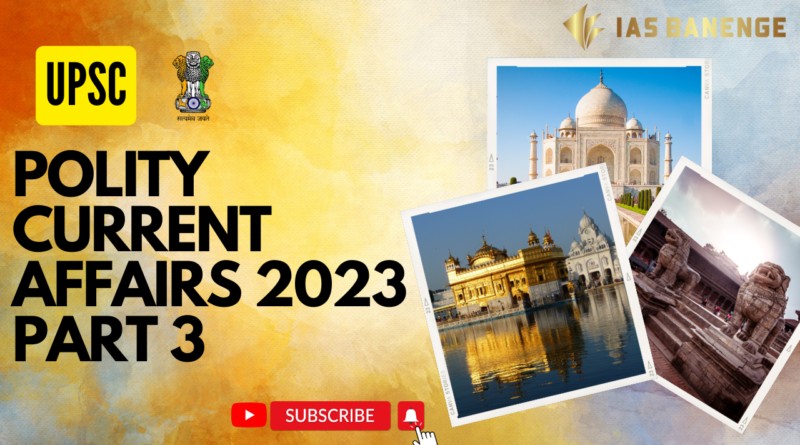Polity and Governance Current Affairs for UPSC 2023 I PART -3
CENTRE- STATE RELATIONS
1. REFORM IN SEVENTH SCHEDULE
Recently, many experts advocated revisiting the seventh schedule of the Indian constitution.
The Seventh Schedule under Article 246 of the Indian Constitution provides for the distribution of powers and responsibilities between the state and central governments through three lists – Union List, State List, and Concurrent List. The residuary powers refer to the jurisdiction of subjects not mentioned in the state or concurrent list and are conferred on the Parliament by Article 248.
The Seventh Schedule can be amended through a special majority of the Parliament (a majority of the total membership of the House and a majority of not less than two-thirds of members present and voting), along with the consent of half of the state legislatures by a simple majority. Other provisions that can be amended in a similar manner include the election of the President, the extent of the executive power of Union and states, the Supreme Court and High Courts, representation of states in Parliament, and the power of Parliament to amend the Constitution and its procedure as provided under Article 368.
2. SUTLEJ YAMUNA LINK CANAL
Sutlej Yamuna Link (SYL) canal issue continues to remain unresolved as Haryana and Punjab have failed to reach any settlement over water- sharing of Ravi and Beas rivers.
The Sutlej Yamuna Link canal is a proposed 214-kilometer-long canal connecting the Sutlej and Yamuna rivers, planned in 1966 after the formation of the state of Haryana out of Punjab. It aims to provide Haryana with its average annual share of surplus Ravi-Beas water. Haryana completed its stretch of the Sutlej Yamuna Link Canal in 1980, but Punjab has not provided its share of water citing Riparian Principles and non-availability of water. The Riparian Principles state that the owner of the land adjacent to a water body has the right to use water. However, Haryana argues that its southern parts of the state are facing a water problem due to depleted groundwater. Haryana has been denied its rightful share in water, as assessed by the Eradi Tribunal in 1987.
Constitution provision for Inter state river water disputes
| Topic | Description |
|---|---|
| Act | Interstate River Water Disputes Act of 1956 |
| Grievance | A state can approach the central government if it has a grievance regarding the use, distribution, or control of waters of any inter-state river or river valley |
| Tribunal | The central government can set up a tribunal for adjudication of the dispute, composed of a chairperson, vice-chairperson, and other members appointed by the central government in consultation with the concerned states |
| Decision | The decision of the tribunal is final and binding on the involved states |
| Implementation | The central government is responsible for the implementation of the decision |
| Amendment | In 2002, an amendment was made to the Act, which provides for the constitution of a permanent tribunal, called the Inter-State River Water Disputes Tribunal (ISRWD), for adjudication of inter-state river water disputes |
Major Inter State River water disputes
| Inter-State River Water Dispute | States Involved |
|---|---|
| Cauvery River Water Dispute | Karnataka, Tamil Nadu, Kerala, Puducherry |
| Mahadayi River Water Dispute | Goa, Karnataka, Maharashtra |
| Godavari River Water Dispute | Andhra Pradesh, Telangana, Maharashtra, Chhattisgarh, Odisha |
| Krishna River Water Dispute | Karnataka, Andhra Pradesh, Telangana, Maharashtra |
| Narmada River Water Dispute | Gujarat, Madhya Pradesh, Maharashtra, Rajasthan |
| Ravi-Beas River Water Dispute | Punjab, Haryana, Rajasthan |
| Vansadhara River Water Dispute | Odisha, Andhra Pradesh |
| Yamuna River Water Dispute | Haryana, Delhi, Uttar Pradesh |
TO THE POINT
- Jharkhand Assembly cleared a bill to increase reservation in vacant government posts and services to 77% but the government stated that it will come into force only after it is included in the Ninth Schedule.The Ninth Schedule was added to the Constitution by the 1st Amendment in 1951 to protect the laws included in it from judicial scrutiny on the ground of violation of fundamental rights.. However, in the I R Coelho vs State of Tamil Nadu case, the Supreme Court ruled that laws inserted into the Ninth Schedule after 1973 cannot escape the “basic structure” test, which means they can still be reviewed by the judiciary for compliance with the basic structure of the Constitution
- AFSPA was removed by Ministry of Home Affairs on account of improved security and law and order situation in parts of Assam, Nagaland, and Manipur states.but it remains in force in parts of these three states as well as in parts of Arunachal Pradesh, and J&K has a similar act.The Armed Forces Special Powers Act (AFSPA) grants special powers and immunity to the armed forces to restore order in “disturbed areas” declared under Section 3 of the AFSPA Act, 1958. These areas are declared by the governor of a state or administrator of a union territory or by the central government when the use of armed forces in aid of civil power is necessary due to a state of disturbance.
- Central government has reconstituted Inter State Council. Under Article 263 of the Indian Constitution, the President is empowered to establish a council and define its nature and duties. In accordance with the recommendations of the Sarkaria Commission, the Inter-State Council (ISC) was established in 1990.
- Department of Expenditure, Ministry of Finance has released 7th monthly instalment of PDRD grant to 14 States. PDRD grants are provided to States under Article 275 of the Constitution to meet the gap in revenue accounts of States post-devolution. The grants are released to States based on the recommendations of successive Finance Commissions. The eligibility of States to receive this grant and the quantum of grant for the period from 2020-21 to 2025-26 was decided by the Fifteenth Finance Commission.
- Khasi Hills Autonomous District Council (KHADC) in Meghalaya has opposed State government’s deal with Assam to resolve boundary dispute
CONSTITUTIONAL/ STATUTORY/EXECUTIVE BODIES IN NEWS
1.UNIQUE IDENTIFICATION AUTHORITY OF INDIA (UIDAI)
Recently, Government amended Aadhaar rules.
The Aadhaar (Targeted Delivery of Financial and Other Subsidies, Benefits and Services) Act, 2016 allows for the updation of supporting documents associated with Aadhaar once by holders after 10 years from the date of enrollment. This updation is intended to maintain the accuracy of Aadhaar-related information in the Central Identities Data Repository (CIDR), which is a centralized database containing Aadhaar numbers and demographic and biometric information of individuals. The UIDAI has clarified that biometric data collected for Aadhaar cannot be used for identifying criminals or solving crimes, as it is not collected for forensic purposes. Additionally, the sharing or use of biometric information for any purpose other than the purpose specified in the Act is prohibited.
2.CENTRAL INFORMATION COMMISSION
Recently, Central Information Commission (CIC) achieved a consistent decline in pendency of RTI (Right to Information) cases with constant rise in disposal of RTI appeals.
The RTI Act of 2005 replaced the Freedom of Information Act of 2002 and aims to empower citizens, promote transparency and accountability in the working of public authorities, contain corruption, and make democracy work for people. The salaries of CIC and ICs at the central level are equivalent to those of the Chief Election Commissioner and Election Commissioners, respectively. However, the RTI Bill of 2019 removes these provisions and empowers the Central Government. The Act includes exemptions under Section 8(1) that prohibit public authorities from sharing information on various grounds such as security, strategic, scientific, or economic interests of the state, information published by any court of law, and records of deliberations of the Council of Ministers, among others. Section 24 exempts intelligence and security organizations specified under its Second Schedule, except for information on allegations of corruption and human rights violations.
3. INVESTIGATIVE AGENCIES IN INDIA
“Chief Justice of India proposes an independent umbrella institution to bring investigating agencies under one roof”
| Investigating Agency | Abbreviation |
|---|---|
| Central Bureau of Investigation | CBI |
| Enforcement Directorate | ED |
| Serious Fraud Investigation Office | SFIO |
| National Investigation Agency | NIA |
| Income Tax Department | ITD |
| Directorate of Revenue Intelligence | DRI |
| Central Economic Intelligence Bureau | CEIB |
| Narcotics Control Bureau | NCB |
| Central Board of Excise and Customs | CBEC |
| Directorate General of GST Intelligence | DGGI |
| Securities and Exchange Board of India | SEBI |
| Directorate General of Anti-Evasion | DGAE |




